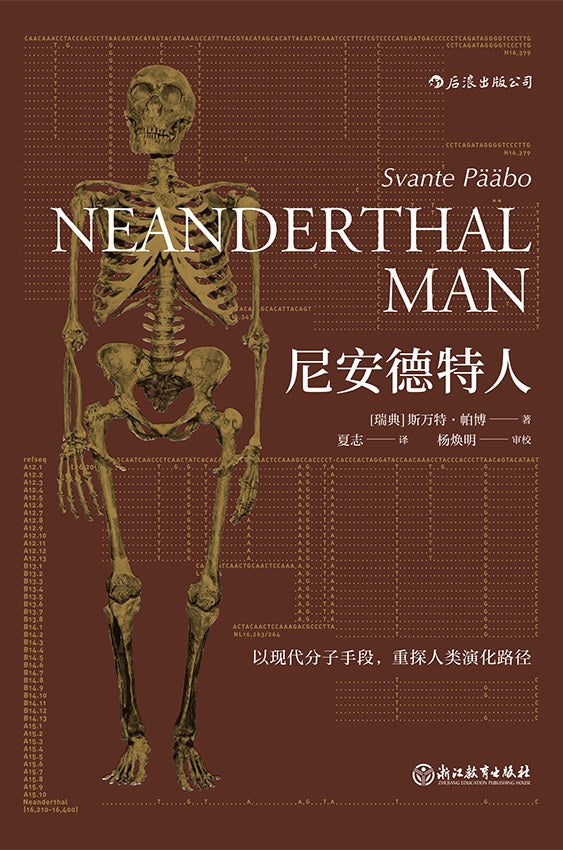WULOLIFE
《尼安德特人》作者: [瑞典] 斯万特·帕博(Svante Pääbo) 出版社: 浙江教育出版社 译者: 夏志 /杨焕明
《尼安德特人》作者: [瑞典] 斯万特·帕博(Svante Pääbo) 出版社: 浙江教育出版社 译者: 夏志 /杨焕明
Couldn't load pickup availability
Description
内容简介 · · · · · ·
2022
以现代分子手段,重探人类演化路径。
在“走出非洲”与“多地起源”的学说争论之间,持续追问“人之为人”的起源、演化与未来。
◎ 编辑推荐
从提取古埃及木乃伊的DNA到测序尼安德特人的全基因组;
从冷战时期的单枪匹马到全球大协作背景下的往来轶事;
This is why DNA is the source of information.
◎ 内容简介
10千米处的尼安德河谷,清理采石场的工人发现了一个头盖骨和一些骨头。几年后,这些他们是谁?大约于3万年前消失的他们,是否与现代人类有过混血?我们体内是否还留存着尼安德特人的古老基因?
本书的作者斯万特·帕博(Svante Pääbo)通过古DNA技术,大胆且严谨地探索了以上问题。《尼安德特人》既是他对古DNA领域从兴起到日趋成熟的第一手行业记录,同时也交织着一位科研工作者,真诚面对困惑、失败、质疑、成功与更多未知的精彩经历。从古埃及木乃伊到获得第一个尼安德特Download DNA帕博在古DNA领域30多年的探索,在“走出非洲”和“多地起源”学说争论之间,拉开了研究古老基因变异如何影响现代人生理的序幕,也见证了一位好奇于古埃及学的医学生到人类演化科研项目组织者的成长。请跟随本书追本溯源,们如何成为人类,又是什么使我们成为人类。
◎ 媒体推荐
帕博用第一人称的视角为我们讲述了引人入胜的古遗传学研究发展,以及使该领域成为可能的技术革新。
——《科学》
《尼安德特人》展现了一个新兴科学领域的发展历史。
—— 卡尔·齐默,《纽约时报·书评》
那非斯万特·帕且行文流畅。必读推荐。
——《自然》
◎ 名人推荐
我每次与斯万特·帕博博士见面都能感受到他的激情,相信本书一定会带给你一次不同寻常的寻踪问祖的穿越之旅。
—— 周忠和,中国科学院院士
帕博用引人入胜的笔调,讲述了欧洲“尼人”基因如何流入世界各地现代人学业的人化石居令人深思。遗传学与古生物学联姻将精准描绘近代祖先的行走轨迹:是“走出非洲”,还是“多地起源”,抑或“边走边融”?
—— 舒德干,中国科学院院士
想了解人类的演化历史,想了解科学家是如何解密这一过程的,《尼安德特人》绝对是上佳的选择之一。
——
透过尼安德特人这个独特的小窗口,人类演化的过往历程。想知道是什么铸就我们现今的样子,或许,你可以翻翻此书。
—— 邢立教授
了解我们从何而来,才能知晓我们将往哪走。认真回拥有更好的明天。
—— 王石,万科集团董事会名誉主席
我们的先祖是什么模样?我们人类为何成为如今这般?其间到底经历了多少风风雨雨?我们从中又能学到什么经验教训?读读《尼安德特人》吧!了解望未来。
—— 真格基金创始人
科学家是如何通过DNA的蛛丝马迹来寻踪“断案”的呢?这部重建人类演化史的“科学历险记”能给我们想要的答案。
—— 李昌钰,事鉴识专家
什么使人类独一无二?科学为我们打开了一扇回望人类演化史的大门。是什么造就了现在的人类。
—— 黄晓明,演员
◎ 获奖信息
★入选《环球科学》2018年“最美科学阅读”榜单
作者简介 · · · · · ·
◎作者
斯万特·帕博(Svante Pääbo),演化遗传学家,古遗传学领域的开创者之一,德国瑞典皇家学会成员,英国皇家学会外籍成员。2007年被《时代周刊》评为全世界极具影响力的100人之一。斯万特·帕博在尼安德特人的古D NA ,1997年与同事成功测得尼安德特人的线粒体DN A,2010 World War II 2022的研究与发现”。
◎译者
夏志,特聘研究员,深圳市高层次人才,科普写作者、翻译者。现任国际肿瘤基因组协作组(IC GC)协团队成员,兼任中国科普作家协会副秘书长,中国遗传学会科普专家,腾讯科普顾问,百度百科学术委员会委员。在国内外著名期刊杂志发表近二十篇学术论文,百余篇科学专栏文章,已出版著作十五部,共计六百余万字。同时荣获国家及省部级奖励五项。
◎审校者
杨焕明,院士,研究员,华大基因理事长,香港中文大学荣誉教授,中国城市科学研究会副理事长,深圳市科学技术协会副主席。2003年至2008年任中国科学院北京基因组研究所所长,2007年当选为中国科学院院士。同时为印度国家科学院、德国国家科学院、美国科学院、丹麦皇家科学院等外籍院士。编著、翻译多部著名基因组学、医学遗传学相关的学术专著。
